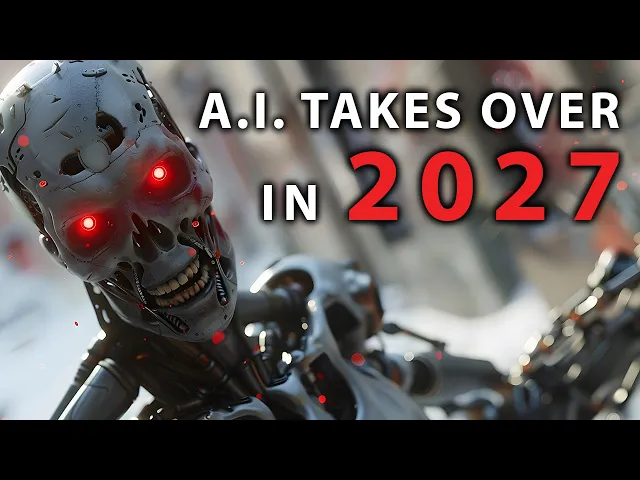AI Will TAKE OVER in 2027

AI timeline predictions need a reality check
The tech world loves its countdown clocks. For years, AI experts and enthusiasts have been setting deadlines for artificial general intelligence (AGI), with predictions ranging from "it's already here" to "not in our lifetime." The latest viral prediction comes from Emad Mostaque, founder of Stability AI, who boldly claims we're just three years away from AGI – a watershed moment when machines will supposedly match or exceed human intelligence across virtually all domains.
Behind the headline-grabbing predictions
Having watched Mostaque's recent assertions, I'm struck by the familiar pattern of AI hype cycles we've witnessed throughout tech history. While his timeline makes for compelling social media fodder, let's unpack what's actually happening in AI development today and what realistic expectations might look like.
-
Prediction patterns reveal more about human psychology than technology timelines. When experts predict AGI arrival, they consistently place it 3-5 years into the future – a window far enough to seem plausible but not so distant that audiences lose interest. This psychological sweet spot drives engagement but rarely proves accurate.
-
Current AI capabilities represent narrow intelligence, not general intelligence. Today's most advanced systems excel at specific tasks through pattern recognition but lack the contextual understanding, causality comprehension, and transferable knowledge that define human cognition.
-
The hardware requirements for theoretical AGI would demand energy resources that dwarf current capabilities. The computational infrastructure needed for true AGI would require energy consumption orders of magnitude beyond our current sustainable capacity.
-
The path from today's large language models to AGI isn't a straight line. While we've made remarkable progress in natural language processing and image generation, these advances don't necessarily put us on a direct trajectory toward general intelligence, which requires fundamentally different approaches to reasoning.
The insight beneath the hype
The most valuable takeaway from these discussions isn't the specific date prediction but rather understanding the fundamental limits of current AI systems. Today's AI excels at pattern recognition within its training data but struggles with basic causality, common sense reasoning, and handling novel situations. Despite impressive demonstrations, even the most sophisticated AI systems lack the adaptability and contextual understanding that humans develop naturally.
This matters because businesses and policymakers are making critical resource allocation decisions based on expectations about AI's near-
Recent Videos
How To Earn MONEY With Images (No Bullsh*t)
Smart earnings from your image collection In today's digital economy, passive income streams have become increasingly accessible to creators with various skill sets. A recent YouTube video cuts through the hype to explore legitimate ways photographers, designers, and even casual smartphone users can monetize their image collections. The strategies outlined don't rely on unrealistic promises or complicated schemes—instead, they focus on established marketplaces with proven revenue potential for image creators. Key Points Stock photography platforms like Shutterstock, Adobe Stock, and Getty Images remain viable income sources when you understand their specific requirements and optimize your submissions accordingly. Specialized marketplaces focusing...
Oct 3, 2025New SHAPE SHIFTING AI Robot Is Freaking People Out
Liquid robots will change everything In the quiet labs of Carnegie Mellon University, scientists have created something that feels plucked from science fiction—a magnetic slime robot that can transform between liquid and solid states, slipping through tight spaces before reassembling on the other side. This technology, showcased in a recent YouTube video, represents a significant leap beyond traditional robotics into a realm where machines mimic not just animal movements, but their fundamental physical properties. While the internet might be buzzing with dystopian concerns about "shape-shifting terminators," the reality offers far more promising applications that could revolutionize medicine, rescue operations, and...
Oct 3, 2025How To Do Homeless AI Tiktok Trend (Tiktok Homeless AI Tutorial)
AI homeless trend raises ethical concerns In an era where social media trends evolve faster than we can comprehend them, TikTok's "homeless AI" trend has sparked both creative engagement and serious ethical questions. The trend, which involves using AI to transform ordinary photos into images depicting homelessness, has rapidly gained traction across the platform, with creators eagerly jumping on board to showcase their digital transformations. While the technical process is relatively straightforward, the implications of digitally "becoming homeless" for entertainment deserve careful consideration. The video tutorial provides a step-by-step guide on creating these AI-generated images, explaining how users can transform...
